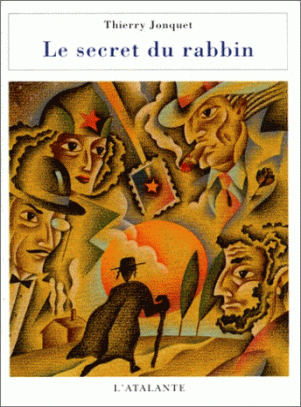
Thierry Jonquet: The Rabbi’s Secret
© L’Atalante, 1995
Translation from French by Adam Simms
Prologue
Niemirov, Galicia: 1920
The spring breeze fluttered through the old hazel tree’s leaves. At its base, a hen cackled as it pecked the dry humus. In the grove of small trees, an army of angry caterpillars launched their assault on budding foliage. The earth was soaked and large puddles of water were strewn along the muddy road…
Close by, noises arose from the nearest houses of the village: Motl, the blacksmith, repairing chains; Yankl the cobbler, hammering steadily; and the ronronron drone of Moishe the tailor’s sewing machine. When the craftsmen took a break, the street’s quiet was broken by children’s voices stumbling over a passage of Talmud in the heder near the village square.
*
Rabbi Mordechai Hirshbaum liked to relax during his siesta, soothed by this peaceful monotonous hum that spread over the village. Seated in his large armchair, on the second storey of his house, shielded from the sun by the old hazel tree’s shade, the rabbi was lost in thought. Dressed in his threadbare caftan, girdled in his fringed vest, his head covered with a streiml whose fur harbored mites, leaning on his cane, he distractedly stroked his long white beard with a finger. His pale blue watery eyes gazed out over the fields and houses of Niemirov, a shtetl lost in the depths of Galicia.
The rabbi’s house was a scene of incredible disorder. Worms found refuge in its dusty furniture, and spider webs almost completely covered volumes of the Talmud, Zohar and Gemara on the library’s bookshelves. A crust of bagel, left and forgotten on a saucer, was offered up to a swarm of mice, whose muzzles twitched in terror at each of the rabbi’s sighs.
Rabbi Hirshbaum sighed a great deal. Vaguely, without taking any pride in some obscure gift of foresight, he had a premonition that times to come would not be kind to the people of Israel.
Mordechai Hirshbaum was not cut off from the outside world. Each week, mail from Lvov brought a bundle of newspapers and journals for the rabbi. Their titles showed that his preoccupations were wide ranging. There were Polish publications, of course; but also German, Russian, and even American. The postal workers who delivered them didn’t even give them a glance. All of Niemirov looked upon Rabbi Mordechai Hirshbaum as a crank, and so no one was surprised that he subscribed to so many publications with such puzzling titles.
Spread out everywhere, even at Mordechai’s feet, were copies of the Berliner Tageblatt, Le Temps and the Washington Post. The news wasn’t good. Yes, the Great War was over and Europe was eager to forget the battlefields and their long columns of soldiers blinded in poison gas attacks, the wounded and mutilated… Articles told of a strange music played by American blacks. Germany was in chaos: a coup d’état had just failed, and its leader, someone named Kapp, had been swept aside by a general strike.
In Poland, Pilsudsky was trying to create… Poland! Before the Great War, Niemirov and all of Galicia belonged to the Austro-Hungarian empire. Yes, the war had given birth to new nations: Czechoslovakia, Romania, Hungary…
“Oy, gevalt!” the rabbi sighed.
Because nothing had changed. None of these new states wanted Jews. Niemirov’s streets were filled with the pitiful sight of refugees driven by pogroms from Lvov, where they had lived hand-to-mouth, working at the thousand-and-one crafts of the poor.
And already the commotion of a new massacre deafened Galicia. This time, it was a matter of defending the Polish homeland against the Bolshevik invader, who they said had teamed up with the Jews. Mordechai knew the names of the revolution’s leaders… Radek-Sobelsohn, Zinoviev-Apfelbaum, Trotsky-Bronstein — each of them Jews!
“Oy, gevalt!” the rabbi sighed again.
These were murky times. In the shtetl — yes, even here in Niemirov — the young let themselves be taken in by fashionable new ideas. They cut off their payiss, deserted the synagogue, discarded the caftan for Western clothing, and talked only in violent slogans. Some declared themselves Zionists or socialists, and were active mysterious organizations: the Bund, Poale Tzion, Hashomir Hatzair…
“Oy, gevalt!” sighed the rabbi once again.
Mordechai Hirshbaum had just celebrated his ninety-seventh birthday. He was born on April 10, 1823! He was very weary and felt he was old fashioned and out of place, despite all the efforts he had finally made to follow the unfolding of the era’s events and to transcend the dreadfully provincial shackles that held Niemirov in their grip. In his heart and mind, he questioned the direction his life had taken … and, had the Eternal seen fit to make him younger, perhaps he would have joined the ranks of these young people who dreamt only of sweeping away the past.
Yes, Mordechai Hirshbaum was truly a strange rabbi. Niemirov didn’t have a renowned rabbinic court, as there were in Belz, Gura Kalvaria or Radzimem. And Mordechai had never dreamt of becoming a tzadik. He had been willingly forgiven on that score. But his eccentricities, his inordinate taste for reading treife literature throughout the course of his life, was worth it, whatever animosities it aroused among the faithful. So much so that one day they decided to bring a new rabbi to Niemirov! Mordechai’s dismissal dated back to 1910.
During the past ten years, he still had his seat in the synagogue; but he no longer led the community’s religious life. He didn’t suffer from his flock’s ingratitude, because the joy he gained from his studies satisfied him fully…
FULL ENGLISH TRANSLATION AVALAIBLE